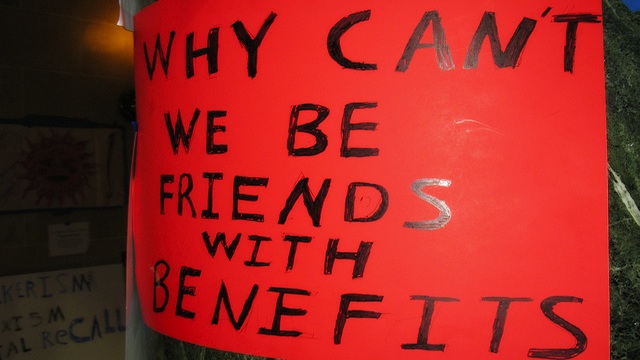
(1) Friends with Benefits: A nice and timely post from the Focal Point blog at Big Think (which is where the photo above comes from; credit goes to Luminis Kanto):
But why do public sector workers get better benefits than private sector workers? Because the public sector is much more heavily unionized than the private sector. Why is that? Because the law makes it virtually impossible to form a union in a private sector workplace these days. So, benefits in the private sector get worse and worse while corporate profits soar. Benefits in the public sector stay relatively good, even in tough economic times because they are organized and they can fight for themselves.
Here's what needs to happen: 1) The Employee Free Choice Act, which would make it a lot easier for workers in the private sector to organize, so that private sector workers can demand their piece of the American Dream; 2) Corporations and rich people need to pay their fair share of taxes so that the public employers can continue to provide decent benefits and wages to their workers—i.e., the people who teach our children, pick up our garbage, purify our water, pave our roads, etc.. Everybody wins.
Here's what's going to happen if we don't do something: 1) The states will crush public sector unions, and wages and benefits will go into a tailspin, for everyone, not just public sector workers. 2) If nobody has any money, nobody buys anything, and private sector companies suffer, so they have to cut wages and benefits and lay people off. 3) If nobody's making any money, nobody's paying any taxes, so the public sector has to cut wages and benefits and lay more people off, and cut public services. Everybody loses.
If you're a robber baron who wants dirt cheap labor, low taxes, and no public services for the undeserving masses, you win big...at least in the short term. In the long term, you're screwed, too because when everyone's living on catfood, nobody will have any money to buy your products. Even Henry Ford understood that he had to pay his workers good wages so they could buy Fords.
(2) Unpaid Work: Two interesting articles on unpaid work at two ends of the employment spectrum: unpaid internships for college students (Unpaid Interns, Complicit Colleges; hat-tip to T.M.); unpaid management-level positions (Unpaid Jobs: The New Normal?).
(3) Two Upcoming Events:
- Steve Early author appearance in NYC on Thursday April 14th:

- D&S-co-sponsored event in Charlestown, Mass. on Tuesday April 12th: Rolling Back the Right: False Problems, Real Solutions to the Budget Crisis. 7pm at the offices of SEIU Local 888; click for a pdf of the flyer for the event.
4. Tax the Super-rich! Joseph Stiglitz apparently admired the cover of our most recent issue when he stopped by our table at the National Conference for Media Reform this morning. With good reason: Stiglitz is all over talking about how the top 1% income earners are robbing us all blind. Check out his article in the current Vanity Fair (Of the 1%, By the 1%, For the 1%), and his interview with Amy Goodman (who is also at the NCMR conference) on Democracy Now! (kind of cool that VF is linking to a DN! video).
But that's not all: other mainstream outlets are making the same points. Check out Tax the Superrich Now or Face a Revolution, from MarketWatch, and this piece from Forbes critical of corporations that evade taxes. (What puzzles me is why these outlets are just discovering now that rich people and corporations don't pay enough taxes.)
(5) U.S. Agreement with Saudis on Libya? An interesting piece from Asia Times: Exposed: The U.S.-Saudi Libya Deal, by Pepe Escobar.
That is all for now.
--Chris Sturr
